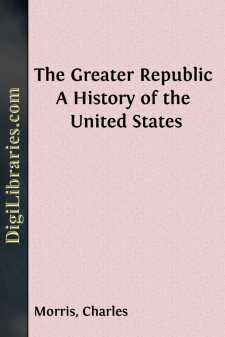Fiction
- Action & Adventure 180
- Biographical 15
- Christian 59
- Classics
- Coming of Age 5
- Contemporary Women 3
- Erotica 8
- Espionage/Intrigue 12
- Fairy Tales, Folklore & Mythology 236
- Family Life 169
- Fantasy 117
- Gay 1
- General 596
- Ghost 32
- Historical 808
- Horror 43
- Humorous 160
- Jewish 25
- Legal 4
- Medical 22
- Mystery & Detective 315
- Political 49
- Psychological 41
- Religious 64
- Romance 159
- Sagas 11
- Science Fiction 730
- Sea Stories 113
- Short Stories (single author) 537
- Sports 10
- Suspense 1
- Technological 8
- Thrillers 2
- Urban Life 31
- Visionary & Metaphysical 1
- War & Military 173
- Westerns 199
Classics Books
Sort by:
CHAPTER I THE LAST SEA LINK WITH FRANCE 1720-1744 The fortress of Louisbourg arose not from victory but from defeat; not from military strength but from naval weakness; not from a new, adventurous spirit of attack, but from a half-despairing hope of keeping one last foothold by the sea. It was not begun till after the fortunes of Louis XIV had reached their lowest ebb at the Treaty of Utrecht in 1713....
more...
by:
Charles Morris
The late war with Spain marks a momentous epoch in the progress of our country, whose history, stretching through the centuries of discovery, exploration, settlement, the struggle for independence, foreign and domestic war, lofty achievement in all departments of knowledge and progress, is the most interesting in human annals. It is a record full of instruction and incitement to endeavor, which must...
more...
by:
Norman Maclean
While the thing is still fresh in my mind I will try to put it down on paper—the incredible thing that has happened in our parish. When we had least thought about life's great things, we have come face to face with the greatest. We had been for long years living on the surface of things. The sun basked on the slopes of the hills, purple at eve; we came back from the offices in town, plunged...
more...
CHAPTER XXVIII. FREEDOM AT LAST ASSURED. As to the Military situation, a few words are, at this time, necessary: Hood had now marched Northward, with some 50,000 men, toward Nashville, Tenn., while Sherman, leaving Thomas and some 35,000 men behind, to thwart him, had abandoned his base, and was marching Southward from Atlanta, through Georgia, toward the Sea. On the 30th of November, 1864, General...
more...
by:
Edith Wharton
THE MUSE'S TRAGEDY Danyers afterwards liked to fancy that he had recognized Mrs. Anerton at once; but that, of course, was absurd, since he had seen no portrait of her—she affected a strict anonymity, refusing even her photograph to the most privileged—and from Mrs. Memorall, whom he revered and cultivated as her friend, he had extracted but the one impressionist phrase: "Oh, well,...
more...
CHAPTER VI. THE GREAT CONSPIRACY MATURING. The 6th of November, 1860, came and passed; on the 7th, the prevailing conviction that Lincoln would be elected had become a certainty, and before the close of that day, the fact had been heralded throughout the length and breadth of the Republic. The excitement of the People was unparalleled. The Republicans of the North rejoiced that at last the great wrong...
more...
CHAPTER XI. THE CAUSES OF SECESSION. In preceding Chapters of this work, it has been briefly shown, that from the very hour in which the Republic of the United States was born, there have not been wanting, among its own citizens, those who hated it, and when they could not rule, were always ready to do what they could, by Conspiracy, Sedition, Mutiny, Nullification, Secession, or otherwise, to weaken...
more...
When the first gun was fired at Fort Sumter, its sullen echoes sounded the funeral knell of Slavery. Years before, it had been foretold, and now it was to happen. Years before, it had been declared, by competent authority, that among the implications of the Constitution was that of the power of the General Government to Emancipate the Slaves, as a War measure. Hence, in thus commencing the War of the...
more...
CHAPTER XXII. FREEDOM'S SUN STILL RISING. After President Lincoln had issued his Proclamation of Emancipation, the friends of Freedom clearly perceived—and none of them more clearly than himself that until the incorporation of that great Act into the Constitution of the United States itself, there could be no real assurance of safety to the liberties of the emancipated; that unless this were...
more...
CHAPTER XVIII. FREEDOM PROCLAIMED TO ALL. While mentally revolving the question of Emancipation—now, evidently "coming to a head,"—no inconsiderable portion of Mr. Lincoln's thoughts centered upon, and his perplexities grew out of, his assumption that the "physical difference" between the Black and White—the African and Caucasian races, precluded the idea of their living...
more...











